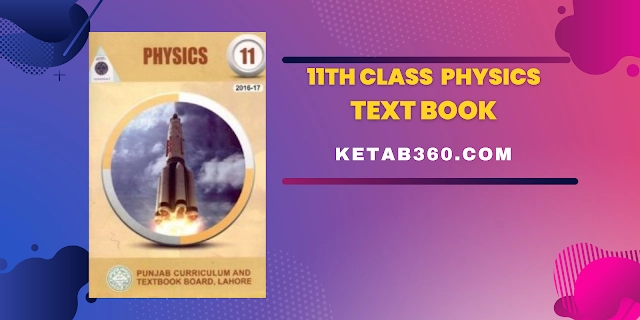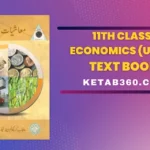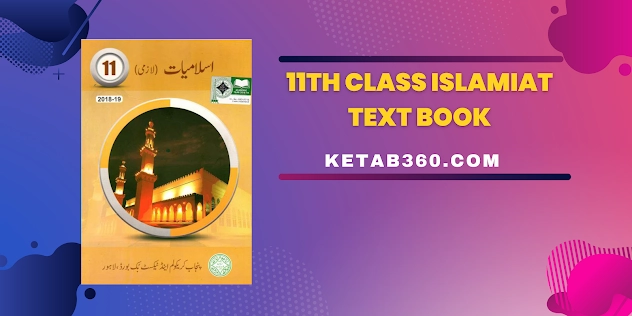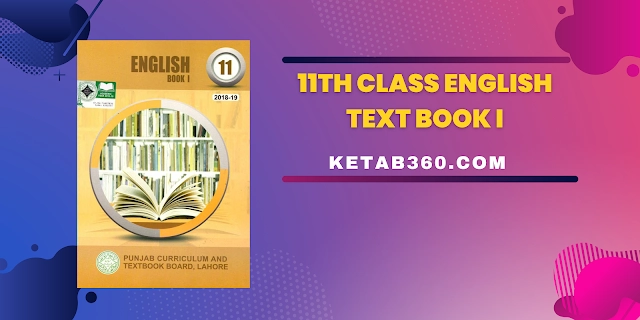11th Class Physics Book By Punjab Board
The 11th class physics book is an invaluable resource for both Fsc pre-medical and pre-engineering students. What sets this book apart and makes it a valuable asset is not only its content but also the expertise of its authors. Among the ten authors who have contributed to this book, one is a renowned Pakistani physicist who has been honored with Sitara-e-Imtiaz.
One of the notable features of this book is its visually appealing design. Unlike the 11th class chemistry book by PTBB, the physics book is vibrant and colorful. It includes additional information and interesting tidbits placed alongside the main content on the pages. The presence of relevant images and diagrams helps to clarify complex concepts and ensures that students do not feel overwhelmed when encountering new ideas.With its well-crafted content and visually engaging presentation, the physics 11th class book is a comprehensive guide that facilitates effective learning for students pursuing both medical and engineering disciplines.
What does the book contain?
This Punjab Text Book is a comprehensive source of knowledge, consisting of 11 chapters. It incorporates various remarkable features that are tailored to align with the new curriculum design.To facilitate understanding of challenging and novel concepts and symbols, the book includes three appendices located at the end of the chapters. Additionally, a glossary is provided to clarify the definitions of different concepts.At the end of each unit, a summary of the chapter is presented, offering a concise recap of the learned concepts and enhancing comprehension. These summaries serve as valuable tools to reinforce understanding.In summary, the book offers a wealth of information and includes helpful components such as appendices, a glossary, and chapter summaries, all of which contribute to a more effective and comprehensive learning experience.
Chapter No. 1 : Measurements
Physics revolves around the study of the impact, interconnections, and characteristics of physical quantities. It is important to note that physical quantities are measurable entities. Therefore, acquiring knowledge of measurement principles is crucial for anyone aspiring to become a physicist. Consequently, the initial focus of Fsc Physics is on the fundamentals of measurement concepts.
While this chapter may seem straightforward at first glance, scientific measurements can pose a slight challenge. Nonetheless, it is undeniably one of the most vital chapters in the subject. By paying close attention and seeking guidance from teachers regarding measurement tools, students can effectively navigate through this chapter.
Chapter No. 2 : Vectors & Equilibrium
Now, let’s dive into the fascinating world of physics. This is where the real essence of the subject begins. In this chapter, students will explore the significance of directions, vector quantities, and the concept of equilibrium in physics. Understanding the concept of directions is crucial as it allows us to comprehend the effects of quantities that are dependent on specific directions. Equally important is the concept of equilibrium, which involves creating ideal conditions where forces and torques balance each other. These foundational concepts lay the groundwork for a deeper understanding of physics.
Chapter No. 3 : Motion & Force
If you admire the groundbreaking work of Newton, then this chapter will captivate your interest. Here, we delve into the profound impact of Newton’s theories and laws, which have shaped our world as we know it today. This chapter explores the intricate relationship between force and motion, examining how forces are applied, how they dissipate, and ultimately, how they set objects into motion. While this chapter may appear complex, it is far from being dry or mundane. Prepare to be engaged and intrigued by the fascinating concepts it presents.
Chapter No. 4 : Work & Energy
Force serves as the foundation for understanding work, power, and energy, making it crucial to include these three fundamental concepts in the physics curriculum for 11th grade by PTBB. This chapter is organized into three sections, with the initial two sections focusing on work and power, while the final section delves into the expenditure and conservation of energy. By comprehending these concepts, students will gain a comprehensive understanding of the interplay between force and the various aspects of work, power, and energy.
Chapter No. 5 : Circular Motion
Motion extends beyond linear paths and encompasses circular and projectile motion, which play significant roles in our everyday lives. This chapter holds particular importance for individuals interested in piloting aircraft or seeking to comprehend the natural movement of objects following circular trajectories. By studying this chapter, students will gain valuable insights into the principles governing circular and projectile motion, enabling them to grasp the complexities and applications of these dynamic forms of motion.
Chapter No. 6 : Fluid Dynamics
The behavior of fluids differs from that of solids, presenting distinct characteristics and principles. Although studying this chapter may seem daunting at first, it primarily involves revisiting and applying familiar concepts of solid motion. Despite its technical nature, this chapter holds an intriguing exploration of fluid dynamics, offering an exciting journey into understanding the movement and behavior of fluids.
Chapter No. 7 : Oscillations
If you recall the waves chapter from your previous studies, this chapter on oscillations will come easily to you. It delves into the motion and consequences of a simple pendulum as it swings back and forth. Additionally, you will explore concepts such as resonance and the behavior of springs in this chapter, expanding your understanding of oscillatory phenomena.
Chapter No. 8 : Waves
Both the 7th and 8th chapters share similar concepts. However, the chapter on waves is specifically crafted to comprehensively explore the properties and characteristics of waves, encompassing various types of waves. It provides a focused study on wave phenomena, offering a deeper understanding of their nature and behavior.
Chapter No. 9 : Physical Optics
Are you fascinated by the enchanting interplay of light and the intriguing properties of lenses? This chapter delves into the captivating realm of lenses and mirrors, revealing the secrets of manipulating light in the physical world and expressing them through mathematical equations. It explores the fascinating phenomena that occur when light interacts with these optical elements, offering you a glimpse into the magical world of optics.
Chapter No. 10 : Optical Instrument
The foundation for this chapter lies in the previous one, where you have gained a thorough understanding of lenses and their characteristics. With this knowledge in place, comprehending the practical applications becomes effortless. This chapter serves as a pivotal point, inspiring students by highlighting how fundamental physical concepts underpin instrumental science. It explores the fascinating world of microscopes and telescopes, unveiling their functions and capabilities. By delving into these topics, students will embark on a journey of discovery and expand their appreciation for the wonders of optical instruments.
Chapter No. 11 : Heat & Thermodynamics
Exploring the dynamics of heat, the predominant form of energy, and its behavior in the physical realm is the focal point of this chapter. It delves into the intricate workings of heat transfer and the mechanisms through which it flows. By grasping these concepts, one can unlock the potential to engineer tools and motors that leverage the properties of heat. Aspiring engineers will find this chapter particularly captivating, as it sheds light on the principles that underpin their future endeavors.
Tips for Effective Study of 11th Grade Physics Text Book in PDF Format.
Studying Physics Text Book effectively in the 11th grade can be accomplished even when using PDFs. Consider the following strategies:
To ensure a focused study session while engaging with the Physics Punjab Text Book , consider the following suggestions:
- Disconnect from the internet: Disable internet connectivity while studying to minimize distractions and maintain concentration on the material.
- Keep pen and paper handy: Have a pen and paper nearby to jot down important points, key concepts, or any thoughts that arise during the study session. This aids in better retention and organization of information.
- Utilize the internet selectively: Turn on the internet only when necessary, such as when you require additional information on specific topics. Use it as a supplementary resource rather than a constant distraction.
- Capture screenshots: If you come across confusing sections or passages in the book, take screenshots to share them with your teacher or classmates for clarification and discussion. This promotes collaborative learning and helps in resolving doubts.
- Prioritize eye safety: Take care of your eyes while studying by wearing appropriate protective gear, such as glasses or utilizing screen filters. This ensures your eyes remain safe and minimizes strain during extended study sessions.
By implementing these recommendations, you can enhance your focus, note important points, utilize the internet judiciously, collaborate with others, and safeguard your eyes while studying the Physics Text Book.






